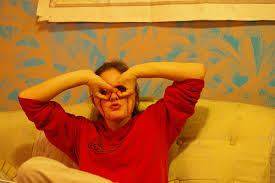 So much of what we struggle with is a matter of perception. We expend energy to fix something we perceive is broken and yet nothing ever changes. We see this as something which is a permanent flaw or an inherent error and so spend even more energy working around it with marginal success. Eventually someone, not realizing the back story of our brokenness, in wondering why we don’t just do this or that, reframes the entire situation turning what was broken into a feature with many positive attributes! The hold up a mirror and ask where the flaw is in all this amazing radiance and for the first time we see what they experience.
So much of what we struggle with is a matter of perception. We expend energy to fix something we perceive is broken and yet nothing ever changes. We see this as something which is a permanent flaw or an inherent error and so spend even more energy working around it with marginal success. Eventually someone, not realizing the back story of our brokenness, in wondering why we don’t just do this or that, reframes the entire situation turning what was broken into a feature with many positive attributes! The hold up a mirror and ask where the flaw is in all this amazing radiance and for the first time we see what they experience.
It’s somewhat of an Ugly Duckling issue. Sometimes we really need to let go of what others say about us and try to see ourselves clearly. On the other hand, sometimes we need to realize that all the advice and opinions are coming from ducks when we’re a swan. The answer isn’t to change who we are, it’s to move to where there are other swans. It’s amazing how reframing things can put them in perspective. I once had to point out to a client that they weren’t anti-social because they didn’t want to hang out in groups, do the same things with their acquaintances, and spend their free time “going out.” They simply needed to associate with people who wanted to spend time in nature, were comfortable with silence, and didn’t need to be in constant contact to maintain the friendship. In short, they were being encouraged to hang out with a flock of ducks and do duck things when they were actually a hunting dog that needed to find its pack. Socializing for them looked very different as it included staking and maintaining territory, keeping their pack safe, and inhabiting a large but well-defined world.
It is important for us to know what lenses we are using to perceive ourselves and the world around us. If our lenses were bequeathed to us by our family, are being provided by our culture, pushed on us by industry or “common wisdom”, or encouragingly gifted to us by our friends, we need to check and see what they are made of. They may claim to help us correct our vision, help us see “reality” and get on the same page with everyone else, but instead they could be coloring the world in a certain way, slanting our perception of ourselves and therefore everything and everyone around us. This may be good for the, but rarely is it good for us. After looking at the lenses and deciding what they actually are and what they do, the next thing we need to do is check if we actually need them. Because more than likely we see just fine.
